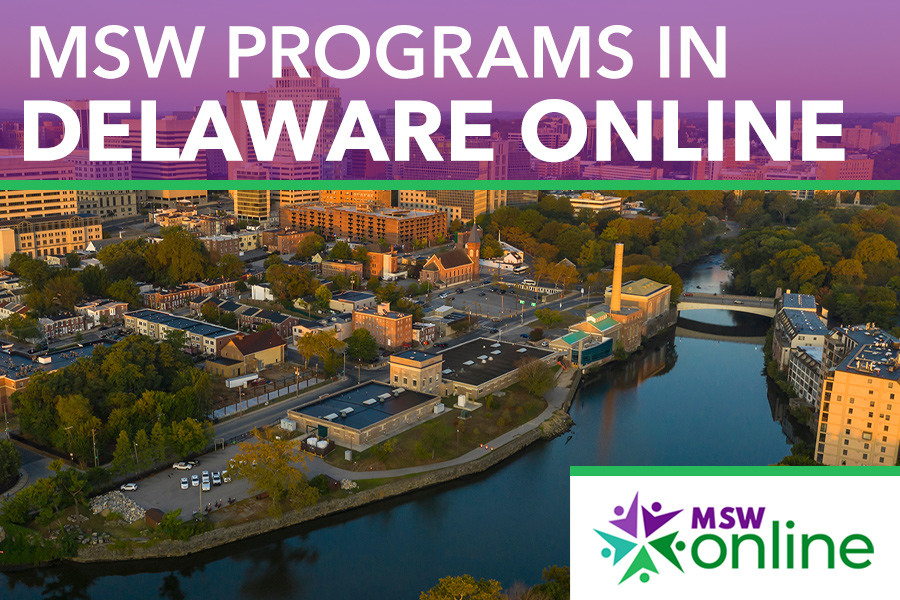MSW Programs in Delaware Online

Delaware offers focused but limited options for pursuing an MSW degree, with Delaware State University currently serving as the only institution providing a fully online MSW program within the First State. The program is fully CSWE-accredited, offering both traditional and advanced standing tracks for students with BSW degrees. Given Delaware’s compact size and the growing demand for online education flexibility, many Delaware residents also pursue MSW degrees through nationally-accredited online programs offered by universities across the country, which provide broader specialization options and diverse scheduling formats to accommodate working professionals.
Despite its small geographic footprint, Delaware presents a surprisingly robust job market for MSW-educated social workers. The state’s strategic location between major metropolitan areas like Philadelphia, Baltimore, and Washington D.C., combined with a densely populated environment and thriving economy, creates diverse opportunities for graduates in clinical practice, healthcare social work, community organizing, and policy advocacy. Whether students aim to become licensed clinical social workers or pursue leadership roles in social service organizations, these programs provide the theoretical foundation and practical skills needed to make meaningful impact in Delaware’s tight-knit communities and the broader regional network of social services.
2026 Best Delaware MSW Programs Online
Delaware State University
Dover, DE - Public 4-Year - desu.edu
Master's - Master of Social Work (MSW) (Advanced Generalist Practice)
Online Learning - Visit Website
Delaware State University's fully online Master of Social Work program emerges as Delaware's sole MSW degree, specializing in Advanced Generalist Practice. Uniquely positioned as an HBCU institution, the program provides comprehensive training across micro, mezzo, and macro practice domains. Students benefit from CSWE accreditation, two flexible internship practicums, and an empowerment-oriented curriculum designed to address complex social challenges. The advanced standing option allows qualified students accelerated degree completion. Graduates are prepared for professional licensing exams and equipped to serve marginalized populations with critical thinking skills and global perspectives.
- Only MSW in Delaware
- Advanced generalist practice concentration
- CSWE fully accredited program
- Two student-selected internship practicums
- National US News ranking
- Priority application: Fall (March 15)
- Advanced standing option available
- Prepare for graduate licensing exams
- Focuses on marginalized populations
- Empowerment-oriented framework
List of Delaware Online MSW Programs
Dover, DE
Delaware State University
- Master's - Master of Social Work (MSW)
Concentration: Advanced Generalist Practice - Online Learning - Website
- Advanced Generalist Practice concentration.
- CSWE-accredited program.
- Two internship practicums required.
- Full-time and part-time options.
- Advanced standing available.
- Priority deadlines in March and September.
- Regular admit deadlines in July and October.
- Part-time deadlines in August and November.
2026 Affordable Online Delaware MSW Program Options
| Delaware State University |
|
|
List of Delaware Advanced Standing Online MSW Programs
Advanced standing MSW programs in Delaware are specifically designed for students who have completed a Bachelor of Social Work (BSW) from a CSWE-accredited program, allowing them to pursue their master’s degree through an accelerated track. While Delaware has limited in-state MSW program options due to its small size, students have access to quality programs that focus on advanced clinical practice, policy development, and community-based interventions to address the state’s unique challenges, including coastal community needs, healthcare access in rural areas, and supporting diverse populations in both urban Wilmington and smaller communities throughout the First State.
Dover, DE
Delaware State University
- Master's - Master of Social Work
Concentration: Advanced Generalist Practice - Online Learning - Website
- Only MSW in Delaware.
- Advanced Generalist Practice concentration.
- Fully CSWE accredited.
- Nationally ranked by US News.
- Experiential learning focus.
- Two internship practicums.
- Prepares for micro, mezzo, macro practice.
- Flexible full-time, part-time options.
2026 Affordable Online Delaware Advanced Standing MSW Programs
| Delaware State University |
|
|
